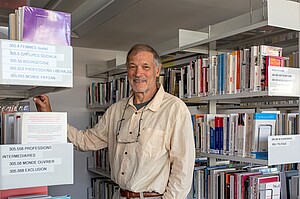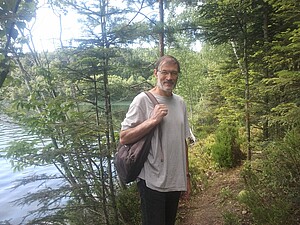There is no longer any need to introduce David Le Breton, sociologist and anthropologist at the University of Strasbourg, who is retiring at the end of his 50-year long career. But it is out of the question for this passionate scholar, who has placed anthropology of the human body at the forefront of the stage, to be giving up his research.
David Le Breton came from a working-class background in Le Mans. Once he had passed his Baccalauréat, he turned towards sociology, psychology and linguistics at the University of Tours. “It was to acknowledge a comment by the anthropologist Margaret Mead who said that students who were unhappy in themselves studied psychology, that those unhappy with society studied sociology, and those who were unhappy in both, studied anthropology”, says Le Breton with a smile, disappointed early on by the Marxist militancy that characterised the teaching of this subject at the University of Tours.
A meeting with the sociologist Jean Duvignaud, with whom he decided to write his thesis, changed his life. But a few months prior to starting, he flew off to Brazil, a country at the height of a dictatorship, that fascinated him. “I was a sort of anthropologist from Mars and didn’t understand the world that surrounded me. I couldn’t bear myself any longer and left with no intention of returning.” He toured the country on foot and hitchhiking, spent each day writing, and ended up by going home.
On his return, he made the decision to live and to become a committed sociologist but not a militant one. Le Breton believes that militancy sets limits, whereas he sees his work as a way of breaking down barriers in the world: “showing that we are never prisoners of our way of being, of our culture”. And in so doing, not being anyone’s disciple. “I advocate independent thinking and concern for the never-ending complexity of the world.”
I stopped taking risks
After completing his thesis on the human body and domination, David Le Breton started working on a further higher education diploma, specialising in psychopathology, and for which he obtained a doctorate. He also went to Mozambique to teach sociology. This was followed by a difficult career path in France where sociology of the human body was little known as a subject, since the human body was considered as belonging to biology. “I earned my living by teaching anthropology, mainly in schools for nursing, executives and social work.”
It was not until 1989 that he was appointed as a university lecturer in Strasbourg, and very quickly became professor at Nanterre University before returning to Strasbourg in 1995, a town that he loves and where he will stay, and which provides him with a certain stability.
Every subject that interests him brings about a need from within, “a will to investigate practices that disturb and bother me.” This is reflected in his work on risk behaviour. “I stopped taking risks, I lost friends to drugs, I wanted to understand. In a manner of speaking, I wrote the book that I would have liked to have read when I was 16 or 17, which would have shed light on my ‘games’ of that time.”
“I have found myself involved in many societal debates including the face, laughter, the voice, pain, the body, adolescent suffering, removal of and transplanting organs and tissue.” David Le Breton suggests specifically an anthropological approach to pain. “Suffering through pain, torture or accident, hurts, whereas a chosen pain, such as when practising a sport or being tatooed, provokes only minor suffering.”
There is no sociology without curiosity
In the early 2000s he was invited to Avignon by Lukas Zpira, a performer friend who practised body suspension with hooks. At the start of the debate, people were horrified. Lukas turned to me and said, smiling: ‘It’s what David says, I feel pain but not suffering’. “That was the best tribute I ever received.”
David Le Breton was nominated to the Institut Universitaire de France 15 years ago. His other passion is teaching. “I consider myself as the travelling companion for students. Transmitting knowledge is fundamental to me, that is what I will miss most. What would be my advice? I see general knowledge disappearing with the use of the internet. Those who will succeed are those who read, who travel, who go to the cinema… You must be curious by nature to study sociology. »
Even after he retires, Professor Le Breton will continue his work and already has a full schedule. This is the concluding point of his career for the time being, illustrated by the 40 or so books he has published. “I never finish, I’m always open to what the world offers. I don’t have the last word, I want to understand, get closer to the subject, all the while knowing that it escapes me.”
Marion Riegert
Good to know
A colloquium - a tribute
The international pluridisciplinary colloquium on human and social sciences « Bodies, Identity(ies) and Societies” around the works of David Le Breton, aims to explore the place of the human body and its anchors in society, “traditional” practices and their adaptations, systems of thinking and their beliefs, fantasies and corporal experiences, metamorphoses and techno-scientific transformations, interactions and social purposes, healing and the arts, ethnic issues and freedom, vulnerabilities and deficiencies, reconfigurations and adjustments, and so on.
-
See the press release, International Colloquium: “Bodies, Identity(ies) and Societies” around David Le Breton (in French)
This article was originally published in French: David Le Breton : « Je laisse ouverte la respiration du monde »

















